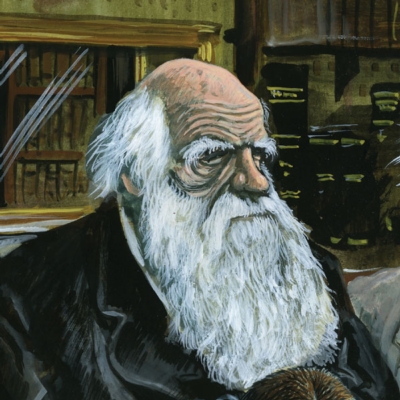
The newspaper was a little slow on the uptake. There does not appear to be an account or review of the book in the paper around its 1859 publication date (price 15 shillings). But five months later, on 20 April 1860, an essay entitled “National and individual rapacity vindicated by the law of nature” appeared, bylined “from a correspondent”.
Its subject is something that scientists, philosophers and many others besides have grappled with ever since – the application of evolution by natural selection to humans. Here’s a flavour:
“It is singular that Darwin does not expressly apply his reasonings to our species. We are, however, most certainly included in his phrase ‘all animals’ … Now, we ask the Times and the Guardian, who deal so harshly with offenders against their lofty moral standard, just to consider what sort of creature man really is. He is not, as they in their vanity suppose, a fallen demi-god, but a promoted mollusc or bit of jelly with a mouth.”
By puncturing our smug self-image as closer to the angels than ocean bottom-feeders, Darwin knew he would provoke violent reactions.
Perhaps that is why it took him two decades to publish his theory. When he did he wrote that it was “like confessing to a murder”.
But that long gestation had given Darwin time to think through many potential challenges to his theory. And remarkably, he neatly anticipated one of the most modern incarnations of religious objection – Intelligent Design (ID).
The first sentence of Darwin’s passage on the evolution of the eye sounds like the naturalist throwing in the towel. The idea that the exquisite, complex structure could have evolved by accumulated random mutations seems “absurd to the highest possible degree”, he writes.
But, Darwin chides us, if you accept the logic that variation between individuals is heritable, and that those individuals with the most successful variations survive to reproduce, then you have to accept that vast chasms of adaptation can be traversed by the plodding accumulation of inherited changes. Natural selection can travel huge distances if given time. “[The reader’s] reason ought to conquer his imagination,” writes Darwin, throwing in a few types of simple eye to show some of the possible steps along the way.
It is this failure of reason to conquer imagination that lies at the heart of ID. Proponents make the very same argument that Darwin counters here, namely that complex structures in nature are too intricate, too improbable, too fantastical to have come about by natural selection.
One favourite example is the bacterial flagellum, a whip-like tail that propels the beast along. It looks beautifully designed, with a drive shaft and motor made up of over 40 proteins. Take one away, and the flagellum stops working. To ID proponents, this “irreducible complexity” means it cannot have evolved.
But this crude attempt at running evolution backwards is meaningless. It turns out that the flagellum’s complexity can be reduced. One bacterial species that lives in our stomach, for example, has 33 proteins instead of the full complement. What’s more, many of the components of the flagellum have turned up doing different jobs elsewhere in bacteria.
And Darwin was a century and a half ahead of the ID crowd. He acknowledges the temptation to liken the eye to a human-produced telescope: “We know that this instrument has been perfected by the long continued efforts of the highest human intellects; and we naturally infer that the eye has been formed by a somewhat analogous process. But may not this inference be presumptuous? Have we any right to assume that the Creator works by intellectual powers like those of man?”
The Origin of Darwinism: Charles Darwin and The Origin of Species, featuring essays by Richard Dawkins and Ian McEwan and edited by James Randerson, is available as an eBook from the Guardian for just £2.99.

